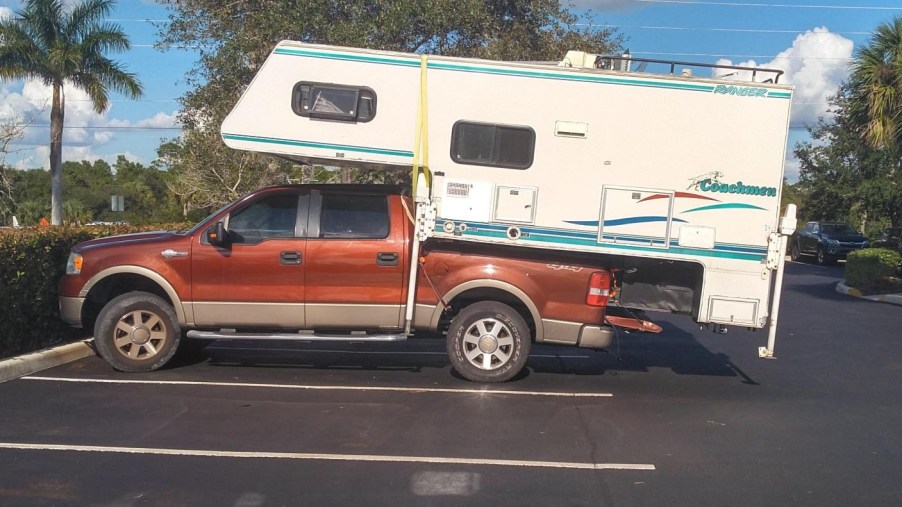
Overloading Your Truck Comes With Serious Consequences
Whether you’re hauling bicycles, motorcycles, or bed campers, a pickup truck’s bed is a useful space. Although not enclosed like an SUV’s trunk, a truck bed has its advantages. Pickup trucks also usually have higher payload and towing capacities. But towing and hauling are more complicated than just strapping a hitch or loading lumber. If not done properly, it can result in serious damage. One truck owner in particular recently learned what can happen from overloading your truck.
The consequences of overloading your truck

As The Drive reports, Reddit user Grover70 posted a photo on the r/F150 sub-Reddit of a Ford F-150 seemingly broken under the weight of a camper installed in its bed. The photo is shown here with Grover70’s permission. Looking into the details, both The Drive and several other Reddit users managed to determine what had happened.
The F-150 shown appeared to be a crew cab 2004-2008 F-150 King Ranch with a short bed. In that spec, the F-150 has a payload capacity of about 2,000 lbs. Specifically, the Ford Truck Enthusiast website quotes a payload capacity of 1298-2749 lbs, depending on the exact spec. However, the Coachmen Ranger camper being carried has a dry weight of 2,800 lbs. In addition, it appears to be designed for a longer bed. Even assuming the best possible scenario, that camper’s too heavy.
Which is why, in the image, you can see the bed beginning to separate from the rest of the truck. It appears the truck’s frame is still intact. But the bed is toast.
Could this happen with a new F-150?
With this specific camper? Probably not.

The 2004-2008 F-Series still used steel for its body and chassis. Switching to aluminum didn’t affect the gross vehicle weight rating, but it did make the F-Series lighter overall. A lighter truck with the same GVWR can tow and haul more weight. Indeed, the current F-150 has the highest payload capacity of any North American market full-size pickup.
With a payload capacity of 3,270 with the Heavy-Duty Payload Package, it’s entirely possible a new F-150 could carry a Coachmen Ranger camper without issue. At least, a camper without anything else in it.
And that, as the Reddit thread discussed, was part of the problem.
How to avoid overloading your truck

The camper in the photo weighed 2,800 lbs dry. That didn’t include additional fluids or gear that may have been stored inside. It’s entirely possible the F-150’s payload wasn’t exceeded by a few pounds, but a few hundred pounds.

Exceeding your truck’s GVWR can be problematic at the best of times. Your truck will handle poorly, take longer to stop, and strain the frame, suspension, and other important systems. It’s not enough to know your camper is light. Hauling equipment and people with your pickup requires knowing how much everything weighs—fluids and all.

The same goes for towing with your pickup. Heavy loads can cause your suspension to wear out quicker. You also need to know what kind of trailer you plan to use, and if your truck can handle the correct load and hitch. Part of that is knowing not just the weight of the trailer’s contents, but the trailer’s weight on its own.


